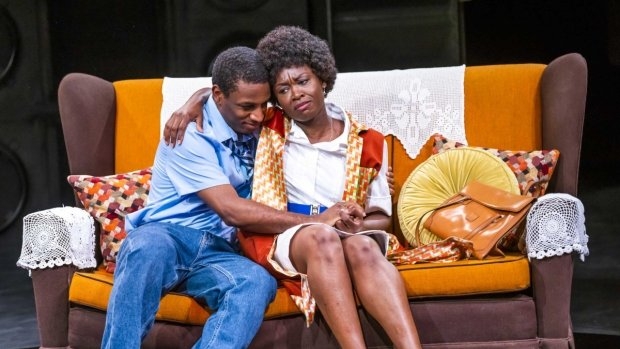”The Darkest Part of the Night” at the Kiln Theatre – review

© Tristram Kenton
This moving new play from Zodwa Nyoni, whose 2020 monologue Nine Lives explored the struggles of a Zimbabwean refugee in Leeds, stays in the same location but shifts focus to the story of a British-Jamaican family, including a boy with autism, over a span of 40 years.
Jumping between the present day and 1981, it shows how far attitudes towards autism – and, to a sadly lesser extent, race – have changed during that period. As an 11-year-old, Dwight, portrayed as both a child and an adult by Lee Phillips, who is himself autistic, is labelled a “freak” and bullied at school. His own deputy headteacher (James Clyde) is among the persecutors, showing zero sympathy for his pupil’s needs and actively looking for ways to ostracise him.
Dwight’s main support comes from his indomitable mother Josephine (Nadia Williams) and big sister Shirley (Brianna Douglas), who fight his corner and understand what makes him tick. His great solace is music; he loves to listen to records, and dance and sing – the stage floor itself comprises an enormous revolving record, while the backdrop of Jean Chan’s expansive design features a bank of speakers, evoking a Jamaican soundsystem, together with a somewhat ominous neon cross (Josephine feels the Lord is always watching).
Dad Leroy (Andrew French) meanwhile is struggling for work and fighting back against the police brutality he has encountered since moving to “the Queen’s country”. Riots are exploding around Chapeltown and beyond. Leroy also believes his son needs to learn resilience and disagrees with his wife’s softer approach. In one telling exchange, she castigates him for failing to stand up to his own mother when she took Dwight to church to “raise the demons out of him”.
But beneath all the tribulations of this family, and there are many, is an unshakeable love. Counterbalancing the pain of Dwight’s mistreatment – firstly at the hands of the school, then at the hands of the police and social services (Hannah Morrish plays his well-meaning but hamstrung social worker) – is the joy of watching his interactions with Shirley and Josephine. These bonds are ultimately what must carry them all through ‘darkest part of the night’.
Nancy Medina directs a spare, stripped-back production, with furniture coming in and out from the side of the stage carried by the cast. Although the flitting between present and past is disorientating at first, and it takes time to attune to the mix of Yorkshire and Jamaican accents, once you adjust to the play’s rhythms it becomes engrossing. And there are some highly impressive performances. Williams gives a powerhouse turn as Josephine (she also plays grown-up Shirley), fussing over the children’s hair one minute, berating her husband the next, but always carrying the can. And Phillips is highly impressive as Dwight, whose poise ultimately proves the piece’s emotional anchor.
At nearly two and a half hours it feels somewhat overstretched. Nevertheless, Nyoni is a writer who combines a forensic eye for detail with a sharp ear for humour. Through telling the story of one family she is able to pinpoint so many failings in the system down the years. The fact it takes a love so strong in order for Dwight to have even a chance at happiness is perhaps the most heartbreaking thing of all.












